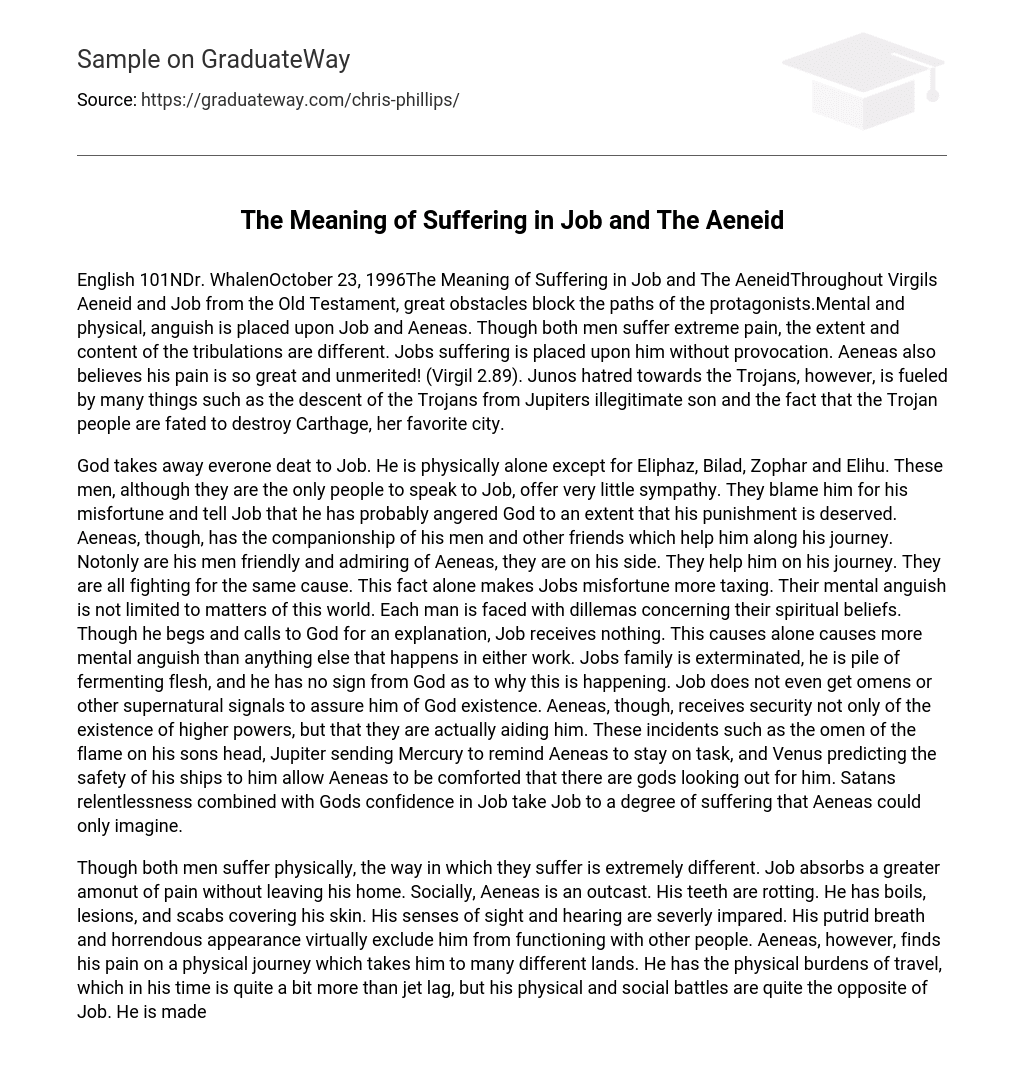Throughout Virgils Aeneid and Job from the Old Testament, great obstacles block the paths of the protagonists.Mental and physical, anguish is placed upon Job and Aeneas. Though both men suffer extreme pain, the extent and content of the tribulations are different. Jobs suffering is placed upon him without provocation. Aeneas also believes his pain is so great and unmerited! (Virgil 2.89).
Junos hatred towards the Trojans, however, is fueled by many things such as the descent of the Trojans from Jupiters illegitimate son and the fact that the Trojan people are fated to destroy Carthage, her favorite city.
God takes away everone deat to Job. He is physically alone except for Eliphaz, Bilad, Zophar and Elihu. These men, although they are the only people to speak to Job, offer very little sympathy. They blame him for his misfortune and tell Job that he has probably angered God to an extent that his punishment is deserved. Aeneas, though, has the companionship of his men and other friends which help him along his journey.
Notonly are his men friendly and admiring of Aeneas, they are on his side. They help him on his journey. They are all fighting for the same cause. This fact alone makes Jobs misfortune more taxing. Their mental anguish is not limited to matters of this world. Each man is faced with dillemas concerning their spiritual beliefs. Though he begs and calls to God for an explanation, Job receives nothing. This causes alone causes more mental anguish than anything else that happens in either work. Jobs family is exterminated, he is pile of fermenting flesh, and he has no sign from God as to why this is happening. Job does not even get omens or other supernatural signals to assure him of God existence.
Aeneas, though, receives security not only of the existence of higher powers, but that they are actually aiding him. These incidents such as the omen of the flame on his sons head, Jupiter sending Mercury to remind Aeneas to stay on task, and Venus predicting the safety of his ships to him allow Aeneas to be comforted that there are gods looking out for him. Satans relentlessness combined with Gods confidence in Job take Job to a degree of suffering that Aeneas could only imagine.
Though both men suffer physically, the way in which they suffer is extremely different. Job absorbs a greater amonut of pain without leaving his home. Socially, Aeneas is an outcast. His teeth are rotting. He has boils, lesions, and scabs covering his skin. His senses of sight and hearing are severly impared. His putrid breath and horrendous appearance virtually exclude him from functioning with other people.
Aeneas, however, finds his pain on a physical journey which takes him to many different lands. He has the physical burdens of travel, which in his time is quite a bit more than jet lag, but his physical and social battles are quite the opposite of Job. He is made even more attractive by the gods. He even has a queen fall in love with him, and were it not for Jupiter and Mercurys intervention, he would have conceivably fallen in love and stayed with Dido.
Though lesions and scabs cover his body, his senses are impaired, and his teeth are rotting, Jobs biggest burden is not of the flesh. It is of the spirit, mind, and soul. Aeneas believes the gods are evil, If the gods will had not been sinister. . . (Virgil 2.74). Job, however, questions Gods nature, but always has faith that God is loving. His biggest concern is not what has happened to him, but why.
Except for Eliphaz, Bilad, Zophar and Elihu, he is physically alone. He begins to wonder if he is spiritually alone as well. The three comforters try to rationalize Jobs suffering after they become mute at his horrid appearance. Aeneas always knows the gods are with him. He knows what his destiny is and what he must do to fulfill it. Even if Aeneass destiny would have been for him to die a terrible death in battle, it would have been easier on his mind than to have no knowledge of his future as was the case for Job.
Each man during his suffering wishes for death. Job calls out, may it turn to darkness (3:4). Aeneas, while on the ship, wishes he would have died in battle rather than face his future. Job and Aeneas feel that their suffering is so great that death would be a better alternative. While Jobs pain may seem greater, death is death, and both men were prepared to accept it with open arms to avoid any more strife.
The degree which each man suffers is rewarded accordingly at the end. Job is rewarded with his family and friends.He gains an abundance of wealth and social stature, as well as Gods gift of longevity. He doubles the size of his family when you consider that he fathers ten new children and still has the ten others waiting in heaven for him. When he arrives there, he will see the true gifts of God.
Aeneas, on the other hand, simply fulfills fate. He builds a city with the help of the gods. Though building a city is a great feat, Aeneas is hardly alone in his struggle. He has thousands of mortals working with him, not to mention the fact that he has the gods working to protect him too.
The proportionate level of suffering weighs heavily on Jobs side. Aeneas has some tough times, but Job suffers almost beyond human capabilities. Aeneas had moments of excitement and adventure along his path, while Job had utter misery. Aeneas had far from a pain free voyage, but he was also worlds away from feeling the desperation and unheralded torture of Job.





